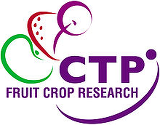February 2023 – January 2027
Deborah Babalola

Alteration in flowering habit has been one of the most significant innovations in many soft fruit crops, extending the season and allowing the most consistent volumes of supply. Raspberries and blackberries can be divided into two different groups according to their fruiting habits; primocane varieties bear fruits in their first-year shoots whereas floricane ones flower and fruit in the second year after the canes have gone through dormancy. Crop scheduling and manipulation of fruiting season to ensure continuity of supply with the same or very similar varieties are becoming key for profitable production worldwide, but interventions are based solely on empirical experience.
Despite the importance of fruiting type and the earliness of fruiting, the genetic control of these traits is poorly understood. Identifying the genes and precise mechanisms controlling initiation of flowering, growth rate and inflorescence development is a key to the advancement of breeding for improved primocane and floricane varieties best suited to modern production systems.
The aim of this PhD project is to understand the genetic control of primocane vs. floricane fruiting habit and earliness of fruiting in both raspberry types in the first instance, and to investigate the correspondence of these traits in blackberry. To map QTLs controlling these traits, the student will utilize existing breeding populations available in the East Malling Rubus Breeding Consortium. Detailed characterization of fruiting habits will be carried out throughout the breeding programme and the most suitable families will be genotyped for mapping using SNP markers. In doing so, this project will contribute to the development of molecular tools in Rubus which currently lags behind strawberry in availability of genomic resources.
Based on QTL mapping data, genetic markers will be developed to facilitate marker assisted breeding, targeting different fruiting habits. To understand the control of flowering in more detail, the expression of selected candidate genes will be studied in varieties with contrasting flowering habits. Moreover, based on our strong expertise in genetic transformation, a gene-editing protocol will be developed for raspberries, and the function of at least two candidate genes will be tested using gene-edited lines as a proof of concept.
